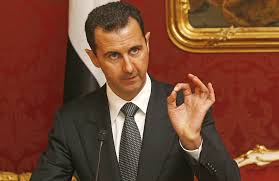BEIRUT, Feb 10, 2015 (AFP) - Damascus receives "information" about air strikes by the US-led coalition against the Islamic State group in Syria, President Bashar al-Assad said in an interview published on Tuesday.

"Sometimes, they convey a message, a general message," he said in an interview with the BBC in Damascus.
"There is no dialogue. There's, let's say, information, but not dialogue.
"There's no direct cooperation," he added, saying the messages came to Damascus through third parties.
"More than one party, Iraq and other countries. Sometimes they convey messages, general messages. But there's nothing tactical," he said.
Damascus has grudgingly accepted the strikes against IS on its territory that began on September 23 last year, but has repeatedly criticised the coalition for failing to coordinate with it.
It says the raids cannot defeat IS unless the international community starts cooperating with Syrian troops on the ground.
Assad said the US-led strikes had the potential to help his government if they were "more serious."
"Yes, it will have some benefits, but if it was more serious and more effective and more efficient. It's not that much."
Washington has ruled out cooperating with Assad's government against IS, and the Syrian leader said Damascus had no interest in joining the coalition.
"No, definitely we cannot and we don't have the will and we don't want, for one simple reason -- because we cannot be in an alliance with countries which support terrorism."
The comment appeared to be a reference to coalition support for other rebels groups fighting to overthrow him, all of which his government derides as "terrorists".
Assad said US officials "easily trample over international law, which is about our sovereignty now, so they don't talk to us, we don't talk to them."
More than 210,000 people have been killed in Syria since the conflict began with anti-government protests in March 2011.
No indiscriminate weapons
===============================
Human rights groups accuse Damascus of indiscriminately killing civilians in air strikes on rebel-held areas, using unguided munitions such as barrel bombs.
But Assad denied that the army was using the makeshift bombs -- crude barrels packed with explosives and shrapnel that are generally dropped by helicopter.
"I haven't heard of (the) army using barrels, or maybe cooking pots," he said, laughing.
"We have bombs, missiles and bullets," he added, dismissing claims that his forces were using indiscriminate weapons.
"There are no indiscriminate weapons. When you shoot, you aim, and when you shoot, when you aim, you aim at terrorists in order to protect civilians," he said.
He also denied claims that Syria's government had used chemical weapons against its own people in August 2013, in an attack outside Damascus that killed up to 1,400 people.
"Who verified who threw that gas on who?" he said.
Asked if his government was responsible, he said "definitely not," adding that the reported death toll was "exaggerated."
He also said his forces were "definitely not" using chlorine as a weapon.
Since Syria gave up its chemical arsenal in a Russian- and US-brokered deal after the 2013 attack, there have been persistent reports of the use of chlorine gas.
In many of those instances, residents reported hearing helicopters, suggesting the involvement of government forces.
